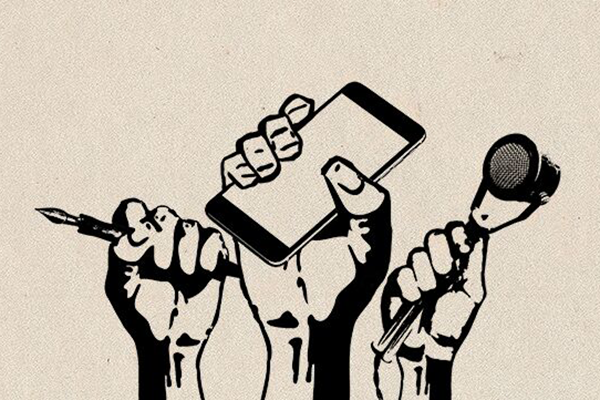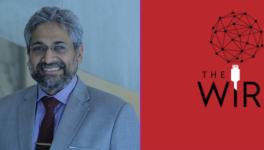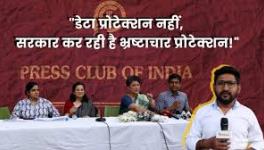India Slips 8 Notches to 150 out of 180 Countries in World Press Freedom Index

New Delhi: At a time of growing attacks on media across the world, press freedom in India has gone from bad to worse, according to the World Press Freedom Report, 2022, brought out by Reporters Without Borders (RWB) on the occasion of World Press Freedom Day on May 3.
The ranking of India fell from 133 in 2016 to 150 in 2021 out of 180 countries, which has revealed growing polarisation .
The polarisation is “amplified by information chaos – that is, media polarisation fuelling divisions within countries, as well as polarisation between countries at the international level,” said an RWB release.
Expressing deep concern over the decline of press freedom in India, some media bodies noted that “the press has been subject to growing conservatism and increasing corporatisation of the industry itself. The extraneous and internal pressures have distorted the notion of a free press today”.
In a joint statement, the Press Club of India, Indian Women’s Press Corps and the Press Association of India said: “Journalists have been incarcerated under draconian laws for flimsy reasons and on some occasions faced threat to their lives as well from self-styled custodians of law in the social media space” adding that “freedom of the press is integral to the functioning of a vibrant democracy.”
The 2022 edition of the World Press Freedom Index, assesses the state of journalism in 180 countries and territories, highlights the disastrous effects of news and information chaos – the effects of a globalised and unregulated online information space that encourages fake news and propaganda.
It noted that within democratic societies, divisions were growing as a result of the spread of opinion media following the “Fox News model” and the spread of disinformation circuits that are amplified by the way social media functions.
“At the international level, democracies are being weakened by the asymmetry between open societies and despotic regimes that control their media and online platforms while waging propaganda wars against democracies. Polarisation on these two levels is fuelling increased tension” the report said.
It may be recalled that in the 2021 report, India was listed under countries considered “bad” for journalism and among the most dangerous places in the world for journalists. It was placed at 142nd rank out of 180 countries.
“The violence against journalists, the politically partisan media and the concentration of media ownership all demonstrate that press freedom is in crisis in “the world’s largest democracy”, ruled since 2014 by Prime Minister Narendra Modi, the leader of the Bharatiya Janata Party (BJP) and the embodiment of the Hindu nationalist right,” the 2022 report said, as quoted by Free Press Journal.
According to the new methodology that defines press freddom, RWB said five new indicators were now used to compile the Index: the political context, legal framework, economic context, sociocultural context, and security.
According to the report: “Originally a product of the anti-colonial movement, the Indian press used to be seen as fairly progressive but things changed radically in the mid-2010s, when Narendra Modi became prime minister and engineered a spectacular rapprochement between his party, the BJP, and the big families dominating the media. The prime example is undoubtedly the Reliance Industries group led by Mukesh Ambani, now a personal friend of Modi’s, who owns more than 70 media outlets that are followed by at least 800 million Indians.”
Citing the example of reporting during the pandemic, it noted that: “under the guise of combatting COVID-19, the government and its supporters waged a guerrilla war of lawsuits against media outlets whose coverage of the pandemic contradicted official statements”.
The report also noted the “harassment faced by Indian journalists who are too critical of the government. According to the report, currently, 13 journalists are behind bars and one journalist was killed since January 1.
Read Also: Enact a Comprehensive Law to Protect Media From Arbitrary Prosecutions, Journalists' Unions Demand
In a statement on the eve of Press Freedom Day, the Delhi Union of Journalists and the National Alliance of Journalists condemned police excesses against journalists across the country.
Just a month ago, three journalists were arrested in the Balia district of Uttar Pradesh under multiple sections of the Indian Penal Code (IPC) after they reported the leak of class 12 English examination paper. They spent over a month in jail as Balia police alleged that journalists were involved in the leak. In another case, six journalists were assaulted while covering an event by a right-wing Hindu organisation on April 6. Delhi police, rather than acting on their complaints, filed a case against one of the journalists.
Journalists in Kashmir continue to face police cases. In one case, a Kashmir journalist, Aasif Sultan, was granted bail on April 5 after he had spent three years and eight months in jail. However, he was re-arrested by police authorities under stringent provisions of the Public Safety Act, 1978.
Get the latest reports & analysis with people's perspective on Protests, movements & deep analytical videos, discussions of the current affairs in your Telegram app. Subscribe to NewsClick's Telegram channel & get Real-Time updates on stories, as they get published on our website.






















